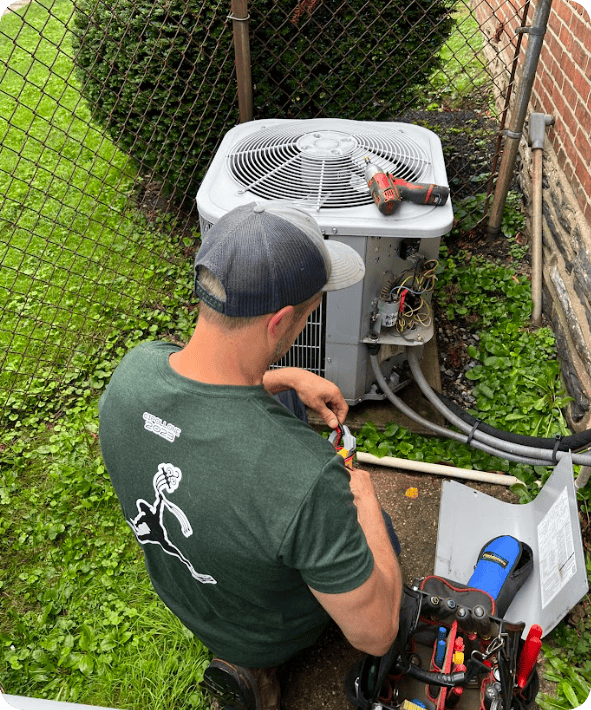Does Your Air Conditioner Use Freon?
 In years past, almost every air conditioner was built using Freon. Now after much research determining that Freon is too harmful to the environment, it is being phased out. Understanding what Freon is, why it’s being phased out, and what your options are if your AC uses Freon is nice information for making informed decisions about your cooling system.
In years past, almost every air conditioner was built using Freon. Now after much research determining that Freon is too harmful to the environment, it is being phased out. Understanding what Freon is, why it’s being phased out, and what your options are if your AC uses Freon is nice information for making informed decisions about your cooling system.
We’ve dealt with thousands of air conditioners that use Freon. We’ve serviced them, replaced, them, and years ago installed them as well. Now we install updated air conditioners that use different energy sources to create cool air.
If you are looking to replace your air conditioner is Ardmore, PA, or the surrounding areas, give us a call at (610) 446-7877, or contact us online. An expert will be able to take a look at your air conditioning system and let you know what the best solution is to cool your home!
What Is Freon?
Freon is a brand name for a group of chemicals known as chlorofluorocarbons (CFCs) and hydrochlorofluorocarbons (HCFCs). These compounds have been widely used as refrigerants in air conditioners, refrigerators, and other cooling devices since the mid-20th century. Freon (specifically HCFC-22 or R-22) became popular due to its efficiency and relatively low toxicity.
Why Is Freon Being Phased Out?
Freon is being phased out primarily due to its environmental impact. When you run your AC, it releases Freon into the atmosphere. These CFCs and HCFCs deplete the ozone layer, which protects the Earth from harmful ultraviolet radiation. The discovery of the ozone hole in the 1980s led to international agreements, such as the Montreal Protocol, aimed at phasing out ozone-depleting substances. As a result, the production and import of Freon (R-22) have been gradually reduced and will be completely halted in many countries.
In the United States, the production and importation of Freon stopped in 2020. Because of this, no more air conditioners that are installed use Freon. This is a good thing, seeing as the new systems are more environmentally friendly, and generally more energy efficient. If you have a system that uses Freon, it is VERY expensive to fill it up, seeing as the supply is so low now.
What Is Replacing Freon?
To replace Freon, the HVAC industry has developed more environmentally friendly refrigerants. One of the most common replacements is R-410A or Puron, a hydrofluorocarbon (HFC) that does not deplete the ozone layer. R-410A is more efficient and operates at a higher pressure than R-22, making it incompatible with older AC units designed for Freon. Other alternatives include R-32 and natural refrigerants like propane (R-290) and ammonia (R-717), which have low global warming potential (GWP).
If My AC Uses Freon, What Should I Do?
If your air conditioner uses Freon, you have several options:
Continue Using Your Current System:
 You can continue to use your existing AC unit as long as it remains operational. However, if your unit needs a refrigerant recharge, finding R-22 will be increasingly difficult and expensive due to the phase-out.
You can continue to use your existing AC unit as long as it remains operational. However, if your unit needs a refrigerant recharge, finding R-22 will be increasingly difficult and expensive due to the phase-out.
Replace Your AC Unit:
Investing in a new air conditioner that uses a modern, environmentally friendly refrigerant like R-410A is the most sustainable and efficient long-term solution. Newer units are designed to be more energy-efficient, which can result in lower energy bills and reduced environmental impact.
Replacing Your AC With An Energy Efficient Solution
When replacing your air conditioner, you want to look at more than just the price tag. Consider a few of these factors when choosing to install a new AC:
- Energy Efficiency Ratio (EER) and Seasonal Energy Efficiency Ratio (SEER): These ratings indicate the efficiency of the air conditioner. Higher ratings mean better efficiency and lower energy bills.
- Size and Capacity: Ensure the new unit is appropriately sized for your home. An HVAC professional can perform a load calculation to determine the correct capacity for your needs. Remember that bigger isn’t always better. If you get an AC that is too big, it could cycle off and on, creating uncomfortable spots and wasting energy.
- Style Of System: Consider what kind of HVAC system you want. There are options for ductless mini splits that can be installed into different zones around the home. Or you could opt for a whole home heat pump. These are a few of the more energy efficient solutions, that can also provide heating as well as cooling!
- Thermostats and Controls: Modern AC units often come with smart thermostats that allow for more precise temperature control and energy management, further enhancing efficiency. Make sure you are getting a thermostat that can help you save energy, while also improving your home comfort.
By transitioning to an energy-efficient air conditioner that uses an environmentally friendly refrigerant, you can help protect the planet while ensuring your home stays cool and comfortable. If you live in Havertown, Ardmore, or the surrounding areas, we can help! John Cipollone Inc. are your air conditioning experts in Ardmore, PA. We can service, repair, or replace your AC system no problem!
